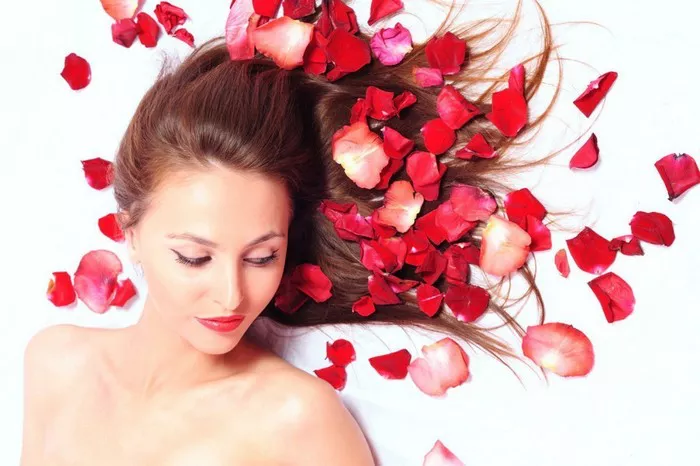Rose water, a fragrant liquid made from the distillation of rose petals, has been used for centuries for its beauty and medicinal properties. It is renowned for its soothing, anti-inflammatory, and hydrating effects, making it an excellent natural remedy for scalp care. In this article, we will explore the various benefits of using rose water on the scalp and provide detailed methods on how to incorporate it into your hair care routine.
The Benefits of Rose Water for the Scalp
1. Hydration and Moisturization
Rose water is an excellent hydrator. It helps to lock moisture into the scalp, preventing dryness and flakiness. A well-hydrated scalp is less prone to issues like dandruff and itching.
2. Soothing Irritation
The anti-inflammatory properties of rose water make it ideal for soothing an irritated scalp. It can help reduce redness, itching, and other signs of irritation.
3. Balancing pH Levels
Rose water helps to balance the scalp’s pH levels. An imbalanced pH can lead to various scalp issues, including dandruff and excessive oil production.
4. Antimicrobial Properties
Rose water has mild antimicrobial properties that can help keep the scalp clean and free from infections. This is particularly beneficial for those who suffer from scalp acne or other scalp infections.
5. Improving Blood Circulation
Applying rose water to the scalp can stimulate blood circulation. Improved circulation means more nutrients and oxygen reach the hair follicles, promoting healthier hair growth.
How to Use Rose Water on Your Scalp
1. Rose Water Scalp Spray
Ingredients:
- 1 cup of rose water
- 1 spray bottle
Method:
- Pour the rose water into the spray bottle.
- After washing your hair, spray the rose water directly onto your scalp.
- Massage gently with your fingertips to ensure even distribution.
- Leave it on and style your hair as usual. There’s no need to rinse it out.
Benefits:
This method is convenient and can be done daily. It keeps your scalp hydrated and can help soothe any irritation.
2. Rose Water Hair Rinse
Ingredients:
- 2 cups of rose water
Method:
- After shampooing your hair, pour the rose water over your scalp and hair.
- Massage gently to ensure it covers your scalp thoroughly.
- Leave it on for a few minutes.
- Rinse with lukewarm water.
Benefits:
Using rose water as a hair rinse helps to lock in moisture and leaves your scalp feeling refreshed. It can also add a subtle fragrance to your hair.
3. Rose Water and Aloe Vera Gel
Ingredients:
- 1/2 cup of rose water
- 1/4 cup of aloe vera gel
Method:
- Mix the rose water and aloe vera gel in a bowl until well combined.
- Apply the mixture to your scalp using a cotton ball or your fingertips.
- Leave it on for 20-30 minutes.
- Rinse your hair with lukewarm water.
Benefits:
Aloe vera gel has additional moisturizing and soothing properties. Combined with rose water, it provides a powerful treatment for dry, itchy scalps.
4. Rose Water and Essential Oils
Ingredients:
- 1 cup of rose water
- 5-10 drops of lavender or tea tree essential oil
- 1 spray bottle
Method:
- Add the essential oil to the rose water and pour the mixture into the spray bottle.
- Shake well to mix.
- Spray the mixture onto your scalp after washing your hair.
- Massage gently and leave it on.
Benefits:
Essential oils like lavender and tea tree have additional antimicrobial and soothing properties. This combination can help treat scalp infections and reduce dandruff.
See Also: How to Use Glycolic Acid on Your Scalp: A Beginner’s Guide
5. Rose Water Scalp Massage
Ingredients:
- 1/2 cup of rose water
- 2 tablespoons of coconut oil (optional)
Method:
- Warm the coconut oil until it is in a liquid state (optional).
- Mix the rose water and coconut oil.
- Apply the mixture to your scalp.
- Massage your scalp with your fingertips for 5-10 minutes.
- Leave it on for at least 30 minutes, or overnight for a deep treatment.
- Rinse your hair thoroughly with lukewarm water.
Benefits:
Massaging the scalp improves blood circulation, which can promote hair growth. Coconut oil adds extra nourishment and moisture.
6. Rose Water and Glycerin Treatment
Ingredients:
- 1/2 cup of rose water
- 2 tablespoons of glycerin
Method:
- Mix the rose water and glycerin.
- Apply the mixture to your scalp using a cotton ball or your fingertips.
- Leave it on for 30 minutes.
- Rinse with lukewarm water.
Benefits:
Glycerin is a humectant that attracts moisture. This treatment is excellent for extremely dry scalps.
Precautions and Tips
1. Patch Test
Before using rose water on your scalp, perform a patch test to ensure you do not have an allergic reaction. Apply a small amount to the inside of your wrist and wait for 24 hours. If there is no irritation, it should be safe to use.
2. Quality of Rose Water
Ensure you are using pure, natural rose water without any added chemicals or artificial fragrances. Homemade rose water or organic brands are the best options.
3. Consistency
For best results, use rose water regularly. Consistency is key to seeing improvements in scalp health.
4. Storage
Store rose water in a cool, dark place to preserve its quality. If you make your own rose water, keep it refrigerated and use it within a week.
5. Consult a Professional
If you have a chronic scalp condition, it’s best to consult with a dermatologist before using rose water as a treatment.
Conclusion
Incorporating rose water into your scalp care routine can provide numerous benefits, from hydration and soothing irritation to promoting healthy hair growth. With its natural properties and versatility, rose water is an excellent addition to any hair care regimen. By following the methods outlined in this article, you can enjoy the refreshing and therapeutic effects of rose water on your scalp, ensuring a healthier and more vibrant scalp environment.


